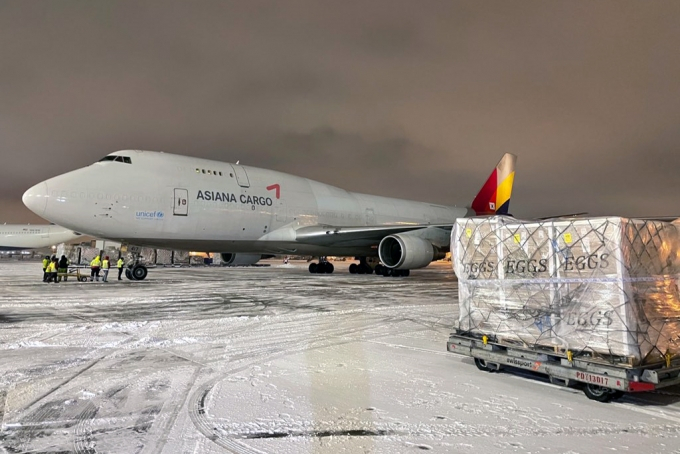Airlines
Race for Asiana's cargo unit heats up among local bidders
The buyer would need to invest a lot in freighters as most of Asiana's cargo aircraft are set to retire, sources say
By Feb 28, 2024 (Gmt+09:00)
1
Min read
Most Read
LG Chem to sell water filter business to Glenwood PE for $692 million


KT&G eyes overseas M&A after rejecting activist fund's offer


Kyobo Life poised to buy Japan’s SBI Group-owned savings bank


StockX in merger talks with Naver’s online reseller Kream


Meritz backs half of ex-manager’s $210 mn hedge fund



The proposed merger of South Korea’s two largest carriers, Korean Air Lines Co. and Asiana Airlines Inc., is intensifying competition among local bidders for Asiana’s cargo business.
Four low-cost carriers – Jeju Air Co., Air Premia Inc., Eastar Jet and Air Incheon – participated in the preliminary bid on Wednesday for the deal estimated at up to 700 billion won ($523.8 billion), according to banking sources.
T'way Air Co., poised to take over Korean Air’s four golden routes to European cities Paris, Frankfurt, Rome and Barcelona, didn’t compete for Asiana’s cargo business.
The divestment of Asiana’s cargo unit is one of the conditions for the merger. Earlier this month, the European Commission gave its nod to Korean Air’s acquisition of Asiana on condition that the merged entity sell Asiana’s global cargo unit and give up the four Europe-bound routes and their slots to T’way.
The sale of the cargo business will require EC’s approval of the final bidder. Asiana plans to select the buyer by the end of this year and sell the unit after the merger.
Asiana’s cargo business is estimated to have posted around 1.6 trillion won in revenue, 70 billion won in operating profit and 300 billion won in earnings before interest, taxes and amortization (EBITDA) for last year.
Market insiders say that it is difficult to estimate the deal value based on the cargo unit’s earnings as Asiana’s belly cargo, the freight carried in a passenger aircraft, has been reflected in the company’s cargo business, not the passenger transportation business.
Some 25% of Asiana’s cargo business revenue is generated through passenger aircraft operations, sources said.
The buyer of Asiana’s freight business would need to inject a large amount of capital to acquire or rent cargo aircraft as most of the 11 freighters, owned or leased by Asiana, are more than 30 years old and set to retire.
If the buyer doesn’t have large passenger aircraft it would be difficult to profit from the belly cargo business, sources added.
Write to Ji-Eun Ha and Jun-Ho Cha at hazzys@hankyung.com
Jihyun Kim edited this article.
More to Read
-
 AirlinesT’way, Air Premia to take off with Korean Air-Asiana merger
AirlinesT’way, Air Premia to take off with Korean Air-Asiana mergerFeb 14, 2024 (Gmt+09:00)
2 Min read -

-
 AirlinesAsiana’s cargo unit sale faces tough hurdles before KAL merger
AirlinesAsiana’s cargo unit sale faces tough hurdles before KAL mergerNov 03, 2023 (Gmt+09:00)
4 Min read -
 Mergers & AcquisitionsAsiana Airlines to sell cargo business for merger with Korean Air
Mergers & AcquisitionsAsiana Airlines to sell cargo business for merger with Korean AirNov 02, 2023 (Gmt+09:00)
3 Min read
Comment 0
LOG IN


